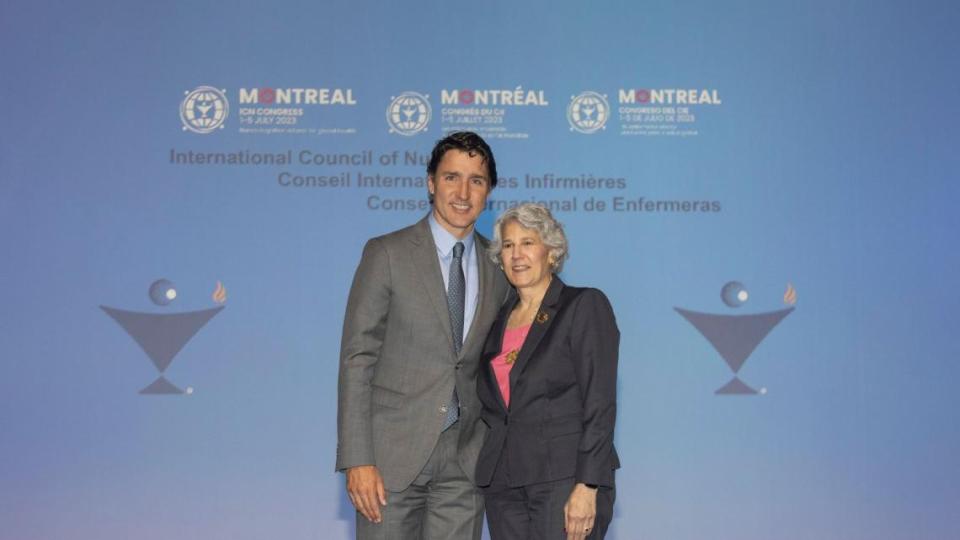Canadian Prime Minister Trudeau makes surprise visit to ICN Congress: “The work of ICN and nurses around world is more important than ever”

Canadian Prime Minister Trudeau made a surprise visit to the ICN Congress in Montreal, Canada, praising nurses for their unique skills, their courage and their service in difficult times.
Mr Trudeau thanked nurses and said ICN’s role representing the world’s 28 million nurses is more important than ever.
“In this consequential time, while we are still climbing our way out of a devastating pandemic, with ongoing armed conflicts in Ukraine and elsewhere, something your ICN CEO Howard Catton discussed earlier, with climate change putting people’s health at risk, the work of the International Council of Nurses is more important than ever.”
“I want to thank you for your efforts, your courage and your sense of service. You have come through some extremely difficult years during the pandemic and there is still lots of pressure of you from the healthcare system."
“It takes a lot of devotion to do 12 hour shifts, day and night, and sometimes not even have time to get a break. Your work is very demanding, and we are lucky to have you because you are indispensable to our health systems.”
Mr Trudeau acknowledged and praised nurses’ communication skills, their help for families when coping with illness, and their holistic knowledge and ability to promote the health and wellbeing of individuals and communities. But he said nurses deserve more than praise for their efforts.
“During the pandemic, we spent a lot of time telling you that you were heroes – because you are true heroes. But nice compliments don’t pay the rent. They don’t give you more autonomy or prevent you from burning out.”
He said the Canadian federal government is acting to support health care workers and patients, including by putting in place a Coalition for Action for Health Workers that gives advice to help address their challenges, and by appointing its new Chief Nursing Officer, Dr Leigh Chapman.
“As an RN herself, and with her frontline experience, Dr Chapman provides strategic advice, including on workforce planning, long-term care, home care, palliative care, mental health, substance use, and scope of practice. This is a very important role and we’re grateful to have her on board.”
Mr Trudeau said he had spoken to a nursing student who had told him she was worried about so many experienced nurses leaving the profession and concerned about her own wellbeing because of a lack of experienced mentors for when she leaves nursing school.
He said Canada is putting additional resources into health care, concentrating on primary care, health care workers, mental health and information, and he expects to see concrete results.
“How will these investments help nursing staff? They will enable people to have access to primary care, thanks to family doctors and nurse practitioners. Family health teams know their patients best; they are the people’s entrance into the health care system. With more effective primary care we can prevent overloading emergency services and reduce pressure on nurses.
‘We must be making sure that nurses are not stretched so thin, that your only choice is to leave this profession that you chose and love. I have heard too many heartbreaking stories over the past year of nurses who still love what they do but have to leave because they feel they are not doing the patents justice: they are stretched too thin, and they are just too overburdened. That’s got to stop.
‘So, we need to improve recruitment and retention strategies, and we need more training opportunities and help for students. To support this – and as a different measure from our $200-billion investment – our government increased and expanded loan forgiveness for nurses working in rural and remote communities. As a result, nurses may qualify for up to $30,000 in loan forgiveness.”
Mr Trudeau said the Canadian government was doing more for mental health services to eliminate taboos around mental health, which allows more people to speak about their mental health problems and tackling an overdose crisis by providing better support and other services.
“Nurses are often the front line of saving lives every day, and you know better than anyone that there are no simple solutions, and that easy slogans won’t fix these issues.”
He spoke about an improved system to track patient’s data and a national nursing database that allows the exchange of information about a nurse’s registration and licensing history.
He said the nursing profession is ageing, and the government is tackling the nursing shortage by improving retention and making it easier for overseas nurses to be processed so that they can register and work in Canada.
Mr Trudeau said he and his fellow Canadians are proud of their universal public healthcare system and that nurses are the best advocates to help improve systems around the world “because you are at the heart of it all. No one has their finger on the pulse of healthcare systems as much as you do.
“The work you do, day in day out, keeping patients, keeping people at the centre of everything we need to focus on, the service, commitment, the dedication, the love for others that you exemplify every single day, here in Canada and all around the world, leaves us all humble, leaves us all deeply indebted, leaves us committed to standing with you and making sure you can continue to do the extraordinary work you do. Here at home and right around the world. Merci beaucoup.”
The ICN Congress is taking place in Montreal, Canada, from 1-5 July 2023.
For more information go to ICN website or follow us on social media #ICNCongress #ICN2023 @ICNurses
Download Press Release
Canadian Prime Minister Trudeau makes surprise visit to ICN Congress: “The work of ICN and nurses around world is more important than ever”
PDF (152 KB)